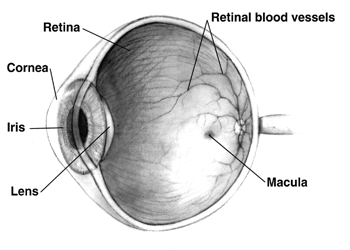Macular Degeneration
Macular degeneration, also known as age-related macular degeneration (AMD or ARMD), is a medical condition that leads to vision loss in the centre of the visual field. This condition predominantly affects older adults and is characterised by damage to the macula of the retina.
Signs and Symptoms
Early or intermediate AMD is often asymptomatic but may present with blurred or decreased vision in one or both eyes, making tasks like reading or driving difficult. Other symptoms include distorted vision, blind spots, slow visual recovery after exposure to bright light, and trouble discerning colours. Visual acuity may drastically decrease, and in severe cases, visual hallucinations and flashing lights can occur. Despite these symptoms, macular degeneration rarely leads to total blindness as peripheral vision typically remains unaffected.


Risk Factors
Key risk factors for AMD include advanced age, race/ethnicity, smoking, and family history. White individuals over 80 years of age are more susceptible compared to Black or Hispanic individuals. Environmental and lifestyle factors such as smoking, hypertension, high cholesterol, obesity, and high fat intake also contribute to the risk. Genetic factors are significant, with variations in genes regulating immune response and retinal homeostasis playing a very important role.

Pathophysiology
The pathogenesis involves oxidative stress, mitochondrial dysfunction, and inflammatory processes leading to the accumulation of intracellular lipofuscin and extracellular drusen. In dry AMD, drusen accumulates between the retina and choroid, causing atrophy and scarring. In wet AMD, abnormal blood vessels grow under the macula, leading to leakage and haemorrhaging.

Diagnosis
Diagnosis involves a comprehensive eye examination. Early AMD diagnosis can include dark adaptation testing, contrast sensitivity tests, and viewing an Amsler grid. Fundus photography can reveal drusen spots, and optical coherence tomography (OCT) is often used. For wet AMD, additional tests like fluorescein angiography and preferential hyperacuity perimetry can visualise abnormal vascular processes.

Management
Early and Intermediate AMD
Management aims to slow progression through lifestyle modifications such as smoking cessation, hypertension management, and dietary changes. Antioxidant and mineral supplementation (AREDS-1 or AREDS-2 formulations) may benefit those with bilateral early or intermediate AMD.
Advanced AMD
For dry AMD, no effective treatments exist. Wet AMD can be managed with VEGF inhibitors like ranibizumab, aflibercept, and brolucizumab, administered via intravitreal injection. Laser coagulation therapy and photodynamic therapy are additional treatment options. Adaptive tools and devices, such as magnifying glasses and electronic readers, help maintain quality of life.

Epidemiology
AMD is more prevalent in Europeans compared to Asians and Africans. The incidence increases with age and is strongly associated with smoking. In the UK, AMD is a leading cause of blindness among the elderly.

Self-assessment MCQs (single best answer)
What is macular degeneration also known as?
Which part of the eye is primarily affected by macular degeneration?
What is a common early symptom of intermediate AMD?
Which of the following is NOT a risk factor for AMD?
What characterises wet AMD?
Which diagnostic tool is often used to identify drusen spots?
What is a recommended lifestyle modification for managing early and intermediate AMD?
Which treatment is used for wet AMD?
In which population is AMD more prevalent?
What is the primary goal of managing early and intermediate AMD?
Dentaljuce
Dentaljuce provides Enhanced Continuing Professional Development (CPD) with GDC-approved Certificates for dental professionals worldwide.
Founded in 2009 by the award-winning Masters team from the School of Dentistry at the University of Birmingham, Dentaljuce has established itself as the leading platform for online CPD.
With over 100 high-quality online courses available for a single annual membership fee, Dentaljuce offers comprehensive e-learning designed for busy dental professionals.
The courses cover a complete range of topics, from clinical skills to patient communication, and are suitable for dentists, nurses, hygienists, therapists, students, and practice managers.
Dentaljuce features Dr. Aiden, a dentally trained AI-powered personal tutor available 24/7 to assist with queries and provide guidance through complex topics, enhancing the learning experience.
Check out our range of courses, or sign up now!


